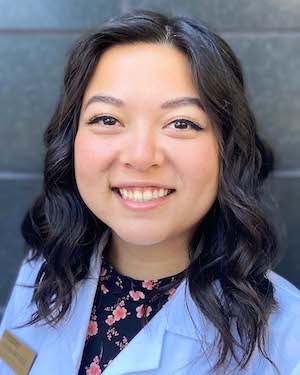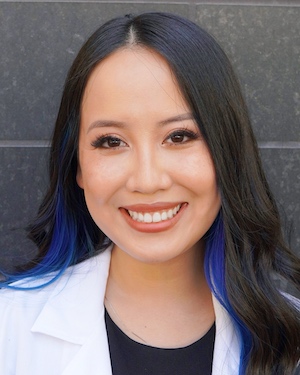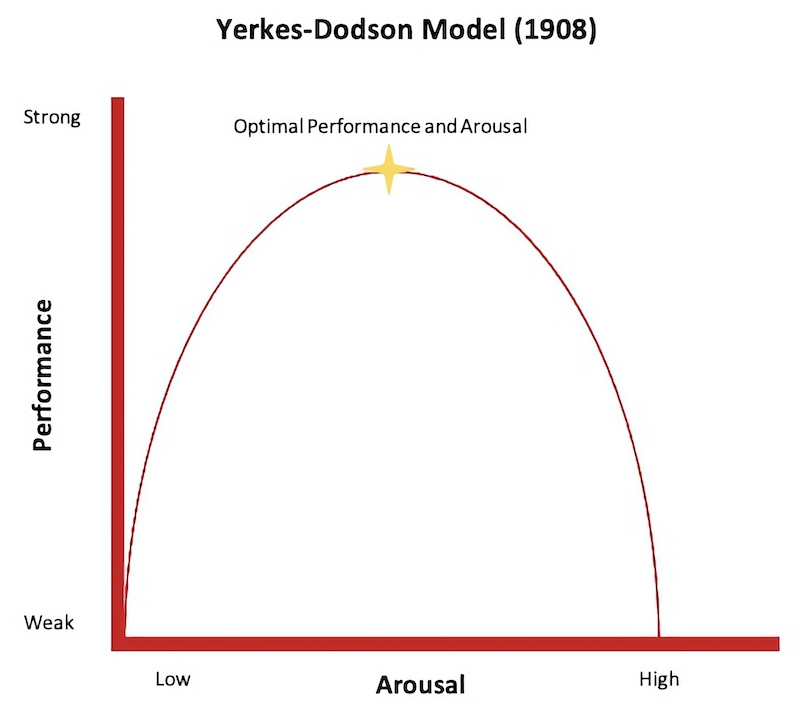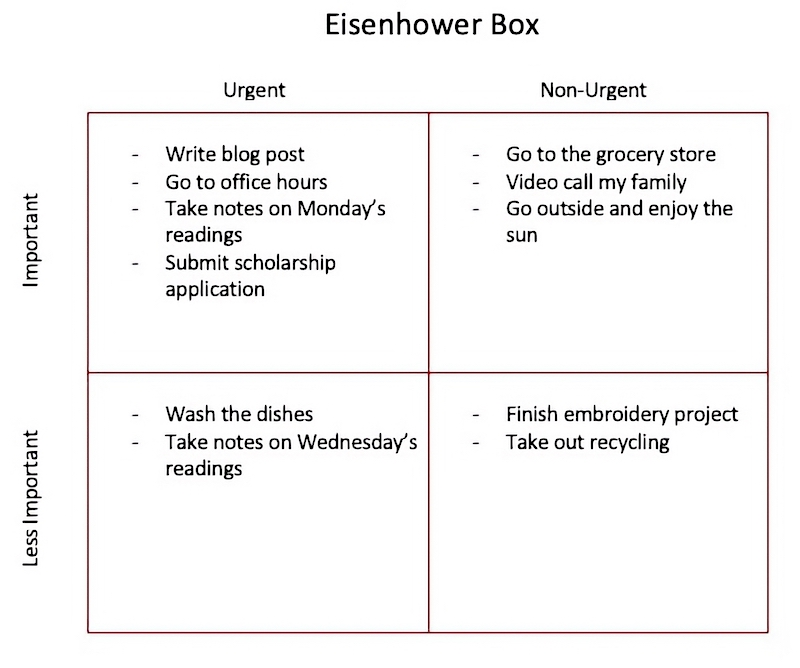Student Blog
Classes

So What Now? ⟩
July 29, 2022, by Andrea
Classes First-Gen Getting Involved What are OS/OT?
So you just discovered OT. Maybe your overly excited roommate shared with you the major or you heard about the amazing occupational science minor classes, like Creativity Workshop from a classmate. No matter how you discovered OT, the field piqued your interest.
Now you may ask yourself, how can I learn more about OT and/or get involved at USC as an undergraduate student? Well, here are some ways you can do just that!
Pre-OT Club
The Pre-OT Club is a great way to learn more about OT through presentations, networking opportunities and guidance from current OT faculty members. The club is open to all USC undergraduate students interested in OT. From collaborations with other health profession clubs on campus to providing advisement for applying to OT graduate school, the Pre-OT club explores ways to dwell deeper into the field of OT.
OS Minor
Whether you have extra units, are ambitious to pick up a minor or are committed to applying to OT graduate school, pursuing an OS minor may be the right choice for you. Minoring in OS prepares you for the career of OT as well as exploring its uniqueness and versatility. Classes like Doing Social Justice and Creating a Sustainable Lifestyle are some examples of such versatility and how anyone can find their path to OT. I never miss an opportunity to recommend an OS class to my friends looking for a fulling class. One of my favorites to recommend is OT 100: THRIVE: Foundations of Well-Being. I took OT 100 online as a freshman and was able to foster vulnerability with my small group as we explored what it meant to thrive in all aspects of life. It’s a great course to learn more about well-being from an OT lens!
Volunteering
Getting hands-on experience is a great way to further your understanding of OT and the daily tasks of a therapist. Because of the many settings OTs can work in, consider volunteering at various sites and/or with different populations/communities. Click here to find a site!
Networking
The “Trojan Family” doesn’t just describe the relationships you build with other USC students, but also the relationships between faculty and students. Consider conducting an informational interview with a faculty member. After a coffee chat or zoom call, speaking with a current OT professional can provide you with relevant information about working in OT, expand your knowledge of the unique pathways, and provide guidance to your journey in OT. One of the ways I was able to network with USC Chan alumn was through the Trojan Network. During my time in the first-generation mentorship program, I was able to connect with current OTs who shared with me their journey to OT and her advice. Alum, Dr. Joyce Yoo, shared with me the importance of getting to know my colleagues and peers “as they are peers as they too are doors of future opportunities.”
In short, your journey to OT doesn’t start at the graduate level! The opportunities here at USC allow you to pursue OT at any point in your undergraduate experience.
As an undergraduate student myself, a rising junior in the BS-OTD program, I love to talk to other students about my passion for OT and always pitch the idea of exploring OT for themselves. If you need any more convincing, let’s have a chat!
⋯

Eclectic Electives ⟩
March 29, 2022, by Alyssa
Classes
The Chan elective options are great for certification hours if you know you’re passionate about specialties like sensory integration or hand therapy. As someone who didn’t want to specialize just yet, I decided to register for a courseload that spanned a bunch of different topics. You can take 12-14 units of electives, and I took full advantage of that with 5 electives.
OT 560: School-Based
I was in the pediatrics immersion my first fall and it was entirely online, so I took this in the hopes of a general review of pediatrics essentials. I never really saw myself working in schools, but 560 has been so fun that now it’s looking pretty nice later down the line in my career. The class includes creative intervention projects, practice with assessments, and this semester we had an opportunity to volunteer with local high school students. This class inspired my externship experience working with high schoolers - more on that in my next blog 😉
OT 574: Motor Control
This class was so highly recommended to me by previous students and I’ll continue to recommend it to future Chan students - it is a must-take if you’re looking for more hands-on learning. We have been learning motor control techniques and applying them to weekly treatment sessions with real patients who have had a stroke. We develop treatment plans and execute them in small groups to help the patients achieve their goals. My group’s patient this semester has been an amazing teacher for us, and I look forward to working with him every week.
Beware though, the nighttime format is not for everyone - this class sometimes runs til almost 10pm! We’re lucky to have engaging professors Remy and Heidi to keep us engaged as best they can.
OT 575: Dysphagia Across the Lifespan
With my interest in working in the hospital setting, dysphagia seemed essential to take. Almost all of my patients in my first level II fieldwork had some form of dysphagia. In that specific hospital, this was handled entirely by SLPs, but I was interested in learning more about the role OT can play. This course only runs for the 1st 6 weeks of the semester, so we’re already done, and it was a whirlwind. Each week we went over assessment and treatment strategies for both pediatric and adult populations. One of my favorite assignments was the feeding lab, where we were given different textures of foods/liquids to test and analyze our own swallows.
OT 577: OS Seminar
If you’ve got NBCOT test anxiety, this is a super useful class. As we near the end of the program, we spend each class reviewing content and sample questions from each of the major topics that will be on the NBCOT. You’re probably fine to sit for the exam with just independent studying, but if you’re looking for more structured review - it’s both lowkey and helpful, 10/10.
OT 590: Directed Research
This class could really be anything you want it to. I have several friends doing research in one of our many amazing labs and getting course credit for it. Others, like myself, are working independently with a faculty member on a topic of interest. I’ve studied assistive technology for adults in courses for my previous degrees, and I wanted to do a deeper dive into AT for pediatrics. Dr. Linsey Grunes is my amazing faculty for this project who supports me as I work on literature reviews, expert interviews, and the development of an online AT catalog resource.
So this semester I’m all over the place, and I’m grateful that I get to do this before committing to one setting, at least for a while, after I graduate.
⋯

My Enemies Are After Me ⟩
March 2, 2022, by Teresa
Admissions Classes Fieldwork
Recently, I watched the stuff on Netflix about fraudsters and all I could think was “Wow, what I wouldn’t give to have their confidence.” Not to get anyone to send me $50,000, but because sometimes, it does feel like my enemies are after me . . . and by ‘my enemies,’ I mean the little voice in my head otherwise known as the “imposter.”
I felt like the biggest imposter ever when I was applying to OT school and when I started this program. If I had to rate my imposter syndrome on a scale of 0 (none) to 10 (worst) around this time, I’d put it at a 10. It was exacerbated both by being waitlisted and being fully remote. As I read the student ambassadors’ blogs, started meeting my classmates on Zoom, and learned from our amazing professors, I was simultaneously romanticizing this image of them in my head – that everyone else was so incredible and had it all figured out while I knew I always felt lost. I’d say I felt this way intermittently throughout my entire first year in the program.
In the past year, it’s resolved a lot. After 12 weeks of level 2 fieldwork, I felt my confidence increase as my competency in skills grew. Once we fully returned to campus last semester, I was comforted by hushed whispers from my peers who shared my confusion during classes. And then came two pivotal experiences this semester which mitigated my imposter syndrome significantly:
- An esteemed faculty member spoke to our class and shared that she still experiences imposter syndrome. That was just mind-blowing to me. There . . . was simply . . . no way? Not with all her achievements, success, and publications. Anyways, in OT, we love evidence-based practice, right? This individual urged us to search in our own history for evidence that we are indeed imposters in order to support the voice telling us we’re not good enough, don’t belong, or not ready for something. Here’s the punch line — you won’t find anything. You’re here at USC, doing the thing you set out to do, against all odds that might have stood in your way. The evidence speaks for itself.
- I heard this advice when I needed it most because it came at a time when I felt like other people were doing the romanticizing thing to me which I had been guilty of doing to others in the past. I had never seen myself as someone worthy enough to be looked up to, so to be placed in those situations felt . . . weird. Anyone who knows me knows that words of affirmation make me uncomfortable, which is something I am actively working on receiving better because it’s not me rejecting kind words, it’s the imposter. I want to see myself the way others see I have the potential to be, not in the distorted way the imposter tries to convince me of.
Going back to the baseline established at the start of this blog (which – you guessed it – we LOVE in OT), I’d say I now teeter around maybe 2 or 3. I entered “imposter” into the search bar on our website out of curiosity to see how I should frame this blog post and it returned ten blog hits from ambassadors past and present. They each approach it from a different perspective, which shows how pervasive imposter syndrome can be when you find yourself in a new or different environment that you’re not used to. But I think this also means you’re putting yourself in situations that challenge you to learn things you didn’t know before, experience growth throughout your life, and continue to prove people wrong, including that imposter telling you you’re a fraud. Sometimes, I hope I never rate my imposter syndrome at a 0 out of fear that it will indicate I’ve reached a threshold in my learning. Anyways, what I’m trying to say is you aren’t alone in this feeling. It can be difficult, but try not to compare yourself and your journey to others because we are only able to see what they choose to present to the world. Just give it some time. Both your confidence and competence will increase and with that, maybe you’ll learn to befriend your ‘enemies.’
⋯

Welcome to Procrastination Nation! ⟩
January 21, 2022, by Seth
Classes Life Hacks
Hi, my name is Seth, and I am a chronic procrastinator. If you know me at all, this is probably no shock to you, and if you don’t know me that well, please say hello to what should be my hamartia! While I’m laying all of my cards on the table, I should also confess that I’ve procrastinated writing this blog. To be clear, it’s not because I don’t want to write this blog or that I’m so busy that I have so many other things to take care of, it’s that I just live for a deadline. I’ll explain more on that in a sec, but first, we need to dig into the realities of procrastination first.
Procrastination is often only portrayed as this debilitating habit that we must overcome to become masters of time management and there is truth to this! I’m sure many of us are too familiar with procrastination that has been taken too far. Who can’t recall the time they cut things too close or ended up not showcasing our best work? This is a reality of procrastination, but it is not the only reality. Real-life is rarely this black and white and there are some theories to back this up! The Yerkes-Dodson Model (1908) details a quadratic relationship between arousal and performance where there is a range of optimality. Another way to talk about this in occupational therapy is a challenge-skill relationship where that optimal range results in a flow experience; one of complete immersion in the task at hand.

Here’s a visual of the Yerkes-Dodson Model! Everyone’s graph looks different depending on their own internal relationship to arousal and performance.
This is to say that eustress, or good stress, can improve the work you have just as much as the other ranges in this relationship can negatively impact your work. While operating under this perspective I have come to find that, for me, procrastination is less about time management and more about emotional management. Earlier I mentioned that I live for a deadline and this is why! I manufactured the perfect challenge for what I perceive to be my skill and viola! I finally get to the work at hand. By now you’re probably thinking, “This is great news, Seth! I feel so validated, but knowing this doesn’t change the feeling in my gut when I’m procrastinating.” And I’m right there with you, so here are some of the thing’s I’ve found that help me work through that feeling:
Using an Eisenhower Box
The strategy I always have in my back pocket and my first line of defense is the Eisenhower Box. This tool is essentially a way to organize tasks into four quadrants based on urgency and importance. Although I’ve found this is a great way to strategize, I always let my gut feeling play a role in the decision-making process, and I encourage you to do the same.

Here’s an example of my Eisenhower box at the moment! It’s constantly changing and even the tasks showed here can switch quadrants depending on when I re-evaluate my box.
Productive Procrastination
Maybe the best strategy I’ve used to generate enough stress to reach my optimal level is to productively procrastinate. This may mean tackling some of the more non-urgent and less important tasks in your Eisenhower box. This often manifests in cleaning your entire living area before starting your readings or just absolutely having to run that errand before writing that paper. This allows you to get other things done while slowly restricting the avenues you have to procrastinate. This leads me to my next point!
Removing Distractions
This is a natural extension of productive procrastination but goes beyond the things that are also on our to-do lists. I’m talking about our phones, the show we’re binge-watching, or the roommate who decided to invite company over right before that first big assignment is due. For me, this means putting my phone in some random drawer in the kitchen, sitting in a place that is not my bed, and either having absolute silence or music that drowns out whatever other noise is around. Take a look at the things that usually distract you and brainstorm ways to work around them.
Diaphragmatic Breathing
Whenever I think about this strategy, I laugh because breathing exercises have always ended up stressing me out more, but this one is a game-changer. Breathing from the abdomen (as opposed to the chest) is a quick way to elicit relaxation. It can release muscle tension, slow the heart rate, and lead to a hearty supply of oxygen to the blood. Try breathing from your chest and then your abdomen, then take note of any difference. If you’re procrastinating and find yourself starting to breathe from the chest, switch the style up.
Knowing Yourself and the Resources Available
I gave a couple of suggestions that have worked for me, but what it all comes down to is knowing yourself! Reflect on how long things have taken you before, your performance on these tasks, and what strategies work for you in managing your stress and procrastination. If you’re trying to find your optimal performance-arousal range, take note of the stress signs that start manifesting for yourself. Figure out when you’re most productive and take advantage of that time (but don’t be afraid to dedicate it to more meaningful occupations too). If you need some help, don’t be afraid to ask! The USC Kortschak Center, an occupational therapy collaborative resource center, has plenty of strategies and consultations that can get you on the best path for you.
Don’t get me wrong, I am not necessarily endorsing procrastination. All, some, or none of this may resonate with you, but I hope that it encourages you to reflect on your procrastination habits. As we head into the third week of the spring semester, I invite everyone to give themselves a little more grace around their habits. Coming around to see that there can be ambivalence around procrastination is a great step in making positive change. It helps us shift the narrative from thinking “I should stop procrastinating” to “I could do XYZ” to make that change more manageable, intentional, and personalized. So get out there and make the change, or put it off until tomorrow! Either way, I hope you’ve enjoyed your stay in Procrastination Nation.
⋯

MA-2, Year 2 ⟩
December 30, 2021, by Silvia
Classes Living in LA What are OS/OT?
2022 is around the corner and so is the end of my time as a student in the Entry-level Master’s program. It is bittersweet to think that just in a couple of months I will be graduating with a master’s degree in occupational therapy and on my way to my second level-2 fieldwork, before prepping for/taking the NBCOT exam and hopefully becoming an *official* OT.
— Woah. Woah. Woah —
Let’s take it back because that still feels very much unreal. Time truly flies by when you’re having fun . . . and when you’re not, tbh. But anyway, I would like this blog to focus on the now, and that is entering my second semester of year 2 of grad school. Like many of us often do with a new year though, I first want to reflect on what last semester was like before sharing what I hope for and look forward to in the upcoming one.
Year 2, Semester 1 (Fall 2021)
Last semester tried me, and it almost won. But it didn’t.
You know when you start a new routine and things feel off, but you tell yourself you just have to get into the swing of things, and eventually, you’ll get your mojo back? Well, that’s exactly what the entire Fall 2021 semester felt like, except I never got into the swing of things, nor did I get my mojo back. Was it the classes or the switch to being fully in-person? Idk, but we pulled through and in the process realizations and reevaluations were made. Here are the 2 that stand out to me:
- A marker of last semester was applying to the OTD program. This was an interesting time because as I was completing the application, which meant staying one more year for another degree, I was complaining about how I had no more school left in me. So, why was I doing that to myself? I came to the realization that I was on “student autopilot” mode and needed to turn it off to figure out what it was that I truly wanted. I am not sure that I completely know yet, but I realize that I don’t have to keep going to prove myself to anyone (including myself).
- Priorities — I spent a lot of time reevaluating these. Before even starting this program, I remember telling my boyfriend that when I’m in school, school is my #1 priority and everything else comes after, but that is definitely not true today. Understanding the importance of meaningful occupations and their impact on my mental health has helped me shift my priorities around. Last semester I spent less time worrying about school and more time loving on my family, spending quality time with friends, and focusing on my physical health.
Though I felt lost most of last semester, I think I actually found myself.
Year 2, Semester 2 (Spring 2022)
We’re ringing in the new year and new semester with a remote start. Back to Zoom we go, but I am not mad about it. Fingers crossed that it is only temporary! I have a good feeling about the Spring 2022 semester, and I am looking forward to 2 things in particular: electives and spending more time with friends before we part our ways after graduation.
- Did you know that the electives are graded CREDIT/NO CREDIT? I didn’t. But now that I do, it is a game-changer. The semester hasn’t even started, but I am already not stressed. *Knock on wood and fingers crossed this stays the same* Also, this semester we are no longer taking classes as cohorts, which means I get to mingle with the rest of our class :’). I am most excited about the pediatric-based courses that I will be taking because that is the area of practice that I am interested in. I’ll be taking OT 567 (Contemporary Issues: Occupational Therapy in Early Intervention), OT 575 (Dysphasia Across the Lifespan: Pediatrics Through Geriatrics), and OT 578 (Therapeutic Communication: Facilitating Change in Clients) — I will let you all know how it goes!
- One of my meaningful occupations is spending time with friends. From study dates to Friendsgiving dinners, I cherish all the memories made. This upcoming semester it is important for me to spend quality time with friends because before we know it, we will be taking different paths — we’ll be at different fieldwork sites, some will be going onto the doctoral program, others will be moving back home, etc. The point is, I want to make the most of next semester with my friends and future colleagues. ❤️
And like that, in the blink of an eye, two years will have flown by.
⋯





